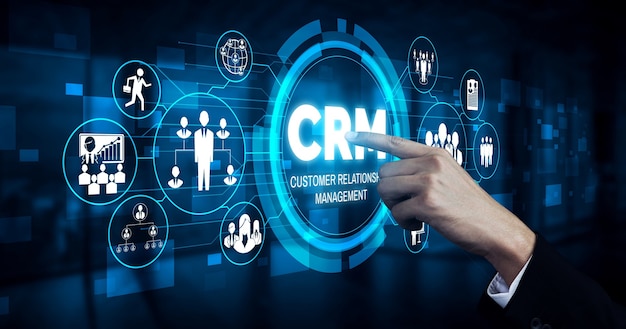
Introduction
In the fast-paced digital world, managing customer relationships and maximizing operational efficiency are paramount for businesses aiming to achieve streamlined success. Digital marketing agencies play a crucial role in optimizing business efficiency through effective Customer Relationship Management (CRM) management and integration. In this article, we will explore the significance of CRM management and integration and how digital marketing agencies can leverage these strategies to streamline processes, enhance customer relationships, and drive business growth.
- Understanding CRM Management and Integration: CRM management involves the implementation and maintenance of a robust Customer Relationship Management system that centralizes customer data, interactions, and insights. Integration refers to the seamless connection between the CRM system and other business tools and platforms. Digital marketing agencies can harness the power of CRM management and integration to optimize business efficiency across various departments and functions.
- Centralizing Customer Data: Digital marketing agencies should prioritize centralizing customer data within a CRM system. By capturing and consolidating information such as contact details, purchase history, interactions, and preferences, agencies can gain a holistic view of each customer. Centralized customer data enables personalized marketing efforts, streamlined communication, and targeted campaigns that resonate with individual customers.
- Enhancing Customer Relationship Management: CRM management allows digital marketing agencies to nurture and strengthen customer relationships. By utilizing CRM features such as customer segmentation, lead scoring, and automated workflows, agencies can deliver personalized communications and ensure timely follow-ups. Effective CRM management empowers agencies to provide exceptional customer experiences, build loyalty, and drive customer satisfaction.
- Streamlining Sales and Marketing Processes: CRM integration with sales and marketing tools streamlines processes and enhances efficiency. Digital marketing agencies can integrate CRM with marketing automation platforms, email marketing software, and sales tools to automate lead generation, lead nurturing, and sales workflows. Integration ensures seamless data transfer, eliminates manual tasks, and enables better collaboration between sales and marketing teams.
- Data-Driven Decision Making: CRM management provides valuable insights for data-driven decision making. Digital marketing agencies can analyze CRM data to identify customer trends, measure campaign effectiveness, and track sales performance. Data-driven decision making allows agencies to optimize marketing strategies, improve customer targeting, allocate resources efficiently, and drive better business outcomes.
- Improving Customer Service and Support: CRM management enables digital marketing agencies to provide superior customer service and support. By utilizing CRM features like ticketing systems, case management, and customer service portals, agencies can streamline support processes, track customer inquiries, and ensure prompt resolution of issues. Efficient customer service enhances customer satisfaction, builds trust, and improves brand reputation.
- Continuous Training and Improvement: Digital marketing agencies should prioritize continuous training and improvement in CRM management. By staying up-to-date with CRM platform updates, industry best practices, and emerging trends, agencies can maximize the benefits of CRM systems. Ongoing training ensures that agencies are well-equipped to leverage the full potential of CRM management and integration to drive business success.

What’s the Significance of CRM Integration?

Understanding the Significance of CRM Integration To grasp the importance of CRM integration, it’s essential to start by discussing the role of CRM software within a company.
CRM, or Customer Relationship Management, serves as a strategic tool that all companies, regardless of their industry, should utilize to gain a better understanding of their customers and their interactions with the company. However, to maximize the benefits of CRM, it’s crucial to integrate your CRM system with the rest of your technology stack.
What Is CRM Integration?
CRM integration, as defined by Hubspot, involves seamlessly connecting your CRM software with third-party applications. These integrations result in automated actions that enhance your software’s functionality, eliminating the need to switch back and forth between systems.
How Does CRM Integration Strengthen Your Business?
A successful CRM system relies on a smart integration framework. “Smart integration” ensures that the right data is available at the right time, enabling automation and orchestration of workflows and critical CRM processes across various applications (such as ERP, social media, phone systems, lead generation, reporting software, mobile devices, calendars, e-commerce systems, and more). Smart CRM integration enhances employee productivity and, ultimately, improves the customer experience.
Cohesive integrations can expand the functionality of the CRM application, which may reside within the ERP or other edge applications. This provides CRM users with a 360-degree view of the customer and eliminates the need to log into multiple systems, boosting employee productivity and enhancing the customer experience.
CRM Integration Tools Integration platforms offer pre-built connectors for commonly used applications that complement CRM systems. Some integration platforms feature prebuilt recipes and automated process integrations that require minimal or low code to implement. These platforms can also function as workflow engines and serve as primary controllers or governors that orchestrate workflows across ERP, CRM, and other systems.
Robotic Process Automation (RPA) can automate workflows and integrate applications, significantly improving employee productivity.
Key CRM Integrations Below are the specific benefits derived from integrating key business processes, which form the foundation of CRM:

- Customer & Prospect Communications
- Customer Interactions: Access, control, and visibility over customer interactions initiated through various communication channels (phone, web, chat, email, or social media).
- Phone: Integration of CRM with the phone system helps record call details and contact information in the CRM, facilitating future reference and visibility. It streamlines incoming and outgoing calls from within the CRM application.
- LiveChat/Chatbots: CRM integration with chat programs or chat features on corporate websites or mobile applications allows chatbots to generate leads automatically and sync communication and leads with the CRM system for a rapid response.
- Email: Integration with email systems (e.g., Outlook or Gmail) enables CRM users to access the internal email client UI from within the CRM application, streamlining email communications.
- Prospect or Lead Management
- Leads generated externally should be processed before loading into the CRM Sales Automation system to determine their status, prior communications, or engagement. Leads can be assessed, classified, and scored based on qualifying criteria, enhancing the efficiency and productivity of the sales team.
- Sales Forecasting
- CRM integration with sales forecasting tools ensures access to historical and real-time sales data, enabling accurate short-term and long-term sales forecasts.
- Sales & Marketing Analytics
- Tools for sales and marketing analytics use data from CRM, ERP, social media, polls, website traffic, and other sources. Integration with multiple systems is required to provide these tools with the necessary data.
- Business Intelligence, Reports, and Dashboards
- Business Intelligence, reports, and dashboards rely on real-time access to information from various systems, both on-premises and in the cloud. Smart CRM integration ensures access to all required data and presents it logically for consumption and processing by these tools.
- Contact Management
- CRM systems often handle contact management, and information within the CRM needs to stay in sync with the ERP system to support billing and order fulfillment processes. Custom information updated in the ERP system should also be reflected in the CRM, reducing duplication of customer records.
- Case Management & Customer Satisfaction
- CRM’s primary role is managing relationships with customers and contacts, providing employees with a 360-degree view of the customer across multiple systems. This enhances the overall customer experience.
- Sales & Marketing Automation
- CRM’s quality lies in its ability to automate sales and marketing processes. Automation often spans across different applications, necessitating data and process integration. This automation includes data collection, analysis, outgoing calls, marketing campaigns, and other tasks, improving productivity and data accuracy.
- Email Marketing
- CRM systems may have limited email marketing capabilities, prompting some companies to use external email marketing systems. Integration with these systems provides access to customer and prospect data for more effective email campaigns.
- Workflow and Approvals
- Prebuilt workflows, present in both CRM and ERP systems, can increase productivity and efficiency. Integration allows for automated end-to-end workflows across multiple applications.
- Social Media Management Marketing
- CRM integration with social media platforms streamlines social media marketing tasks and facilitates collaboration among employees and departments.
- Calendar Sync
- Bidirectional synchronization of employee calendars with CRM schedules enhances productivity and ensures that employees receive scheduled prompts and reminders.
- Mobile Devices and Applications
- Integration with mobile devices and applications used by employees, vendors, and customers increases productivity and improves the customer experience.
- File Sync and Sharing
- CRM applications can serve as synchronization platforms for enterprise applications, syncing email accounts, file shares, and imported Excel worksheets.
- Call Center Automation
- Integration with CRM streamlines call center operations by consolidating multiple systems into a single user interface, boosting employee productivity and improving the customer experience.
- Contract and Proposal Management
- CRM integration with document signing platforms simplifies the management of contracts and proposals directly from the CRM.
- E-commerce Systems
- Integrating CRM with e-commerce platforms provides insights into customer behavior and preferences.
- Opportunity to Quote Process
- Streamlining the Opportunity to Quote process through CRM integration with ERP and quoting systems can lead to faster responses to potential customers.
- Opportunity to Order Process
- Qualifying opportunities, or lead scoring, ensures that the right leads are prioritized, optimizing the sales process and increasing efficiency. CRM integration with ERP systems allows for smooth order processing.
- Return Material Authorizations (RMAs)
- CRM integration with ERP systems streamlines RMA processes, reducing costs associated with returns.
- Event Management
- Integration with event management software, webinars, virtual events, or business card scanners at trade shows enhances lead generation and event tracking.
- CRM Access Management
- Integration with ERP, HCM, and Identity Management systems automates user provisioning and de-provisioning, increasing productivity and reducing compliance-related risks.
- Sales Performance
- Integration with ERP systems automates the calculation of projected sales commissions and provides sales performance statistics, enabling efficient incentive management.
- Forms and Surveys Data Collection
- Integration with electronic forms and surveys simplifies data collection and processing, even for hard copies or digital files received via email.
Incorporating CRM integration across these key areas can significantly enhance the capabilities of a CRM system and empower businesses to better serve their customers while improving internal efficiency and productivity.

Conclusion
CRM management and integration serve as powerful tools for digital marketing agencies to optimize business efficiency, enhance customer relationships, and drive streamlined success. By centralizing customer data, enhancing customer relationship management, streamlining sales and marketing processes, enabling data-driven decision making, improving customer service, and prioritizing continuous training, agencies can unlock the full potential of CRM. Through effective CRM management and integration, agencies can achieve operational excellence, deliver exceptional customer experiences, and fuel business growth in the dynamic digital landscape.
If you are looking one click here, contact us here
Follow us on Instagram
